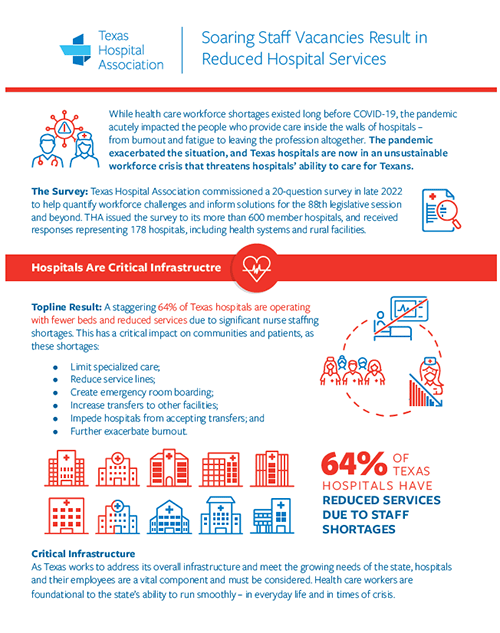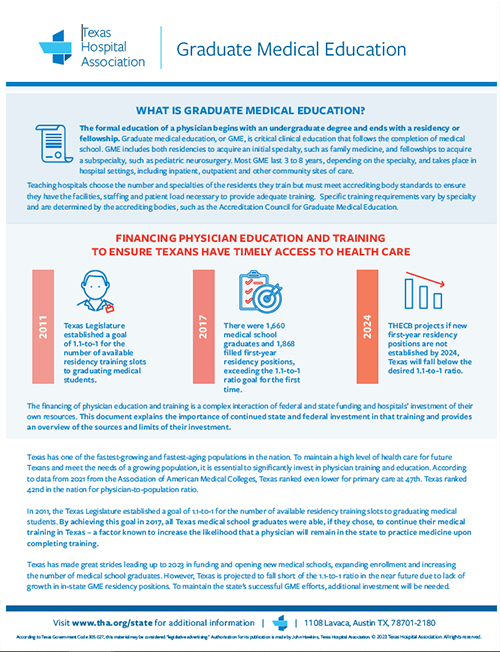With a population growing more than twice as fast as the national average – and people living longer and experiencing more chronic illness – the demand for health care has never been greater. Unfortunately, Texas has too few health care professionals to meet the health care needs of its growing population.
The state has well-documented shortages of primary care physicians and other specialists, including psychiatrists. More than 80% of Texas counties are designated as mental health professional shortage areas, and about 40% of Texas counties’ primary care health needs are not currently being met. Shortages of nurses and allied health professionals contribute to this problem.
The Texas Legislature has invested significant funds to increase the size of the health care workforce in Texas, but continued investment is required to combat the severe shortage of physicians, nurses and other health care professionals.
Growing the health care workforce in Texas, including the number of behavioral health professionals, is a top priority for the Texas Hospital Association.
The Workforce Issue
In 2023, more than 60% of hospitals were operating with fewer beds and reduced services due to lack of staff. These shortages are occurring not only because of a decrease of available physicians, nurses and other professionals at the end of the workforce pipeline, but also because of a bottleneck leading to it:
- It’s projected that by 2032, demand for full-time registered nurses in Texas will outpace the supply by more than 57,000 positions, a 16% deficit.
- The registered nurse vacancy rate increased by nearly threefold between 2019 and 2022, from 6% to 17.6%.
- Texas nursing schools turned away 13,705 qualified applications in 2023 because of inability to accommodate the applicant demand, citing a lack of faculty and clinical space.
Burnout, the additional stressors in the hospital workplace during the COVID-19 pandemic, and workplace violence are all cited as causes for a recent exacerbation to a workforce shortage that already existed before the pandemic.
2025: A Time to Both Study and Act
The Texas Legislature demonstrated an understanding of the industry’s workforce problems during its 2023 session with several critical legislative moves – foremost among them Senate Bill 25.
SB 25 revamped a long-dormant nursing scholarship program, expanded eligibility for the state’s Nursing Faculty Loan Repayment Assistance Program to include part-time nursing faculty and created grant programs to support the expansion of clinical training for nursing students using education from nurse preceptors.
Fully realizing the replenishing potential of SB 25, however, will require more attention from lawmakers. For 2025, THA is asking the Legislature to study the implementation and impacts of SB 25 on the state’s nursing shortage – and to provide robust funding for the clinical site nurse preceptor grant program, which wasn’t funded as part of the 2024-25 budget.
THA is also asking that lawmakers:
- Study and identify impediments to educating and training new nurses, including barriers to securing clinical space for nursing students and consideration of the wage differential between clinical nurses and nurse preceptors.
- Consider offering state incentives to encourage more participation in nurse preceptor programs.
- Examine the totality of workforce shortages in health care – including a look not just at nursing shortfalls, but also shortages of medical assistants, radiology and surgical technicians and pharmacy technicians.
Revisiting Gains: Key Workforce Funding From 2023
Along with assessing the impact of SB 25, THA is also asking the Legislature to monitor the effectiveness and distribution of several key valuable funding moves lawmakers made in the last state budget to help address the shorthanded state of the health care field. Key dollar allocations legislators contributed to the cause during the 2023 session included:
- $28 million for the Mental Health Professionals Loan Repayment Program, a $26 million increase from the previous two-year budget;
- Almost $47 million for the Professional Nursing Shortage Reduction Program, an increase of nearly $28 million; and
- $7 million for the Nursing Faculty Loan Repayment Assistance Program, a $4.1 million increase.

Workplace Violence Prevention Toolkit
The Texas Legislature addressed workplace violence in hospitals during its 2023 session with two crucial new laws aimed at protecting health care workers. This workplace violence prevention toolkit from THA and the Texas Nurses Association outlines the particulars of the new laws and also contains information on other state and federal laws related to workplace violence.

Soaring Staff Vacancies Result in Reduced Hospital Services
While health care workforce shortages existed long before COVID-19, the pandemic acutely impacted the people who provide care inside the walls of hospitals – from burnout and fatigue to leaving the profession altogether. The pandemic exacerbated the situation, and Texas hospitals are now in an unsustainable workforce crisis that threatens hospitals’ ability to care for Texans.

Graduate Medical Education
The formal education of a physician begins with an undergraduate degree and ends with a residency or fellowship. Graduate medical education, or GME, is critical clinical education that follows the completion of medical school. This document explains the importance of continued state and federal investment in that training and provides an overview of the sources and limits of their investment.
Additional Resources
- Clearing the Pipeline: Workforce Shortages Still Haunt Texas Hospitals (9/24)
- Soaring Staff Vacancies Result in Reduced Hospital Services (2/7/23)
- Graduate Medical Education (2023 THA white paper)
- THA Comment Letter on FORWARD Loans (11/4/22)
Related Articles
Beyond Shortages: Nursing Faces an Experience Crisis
This article is sponsored by Keypath Education. While shortages dominate…
Need a Leader? Call a Nurse.
Frontline nurses are equally skilled in compassionate bedside manner as…
THA, TNA Release New Toolkit to Help Hospitals Prevent Workplace Violence
Following the passage earlier this year of two crucial new…
Money Attracts But Fails to Retain New Physicians
A joint study from the Medical Group Management Association (MGMA)…




